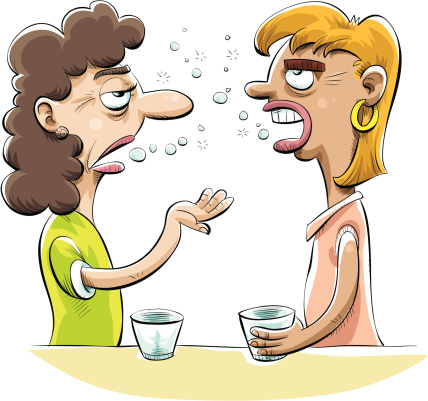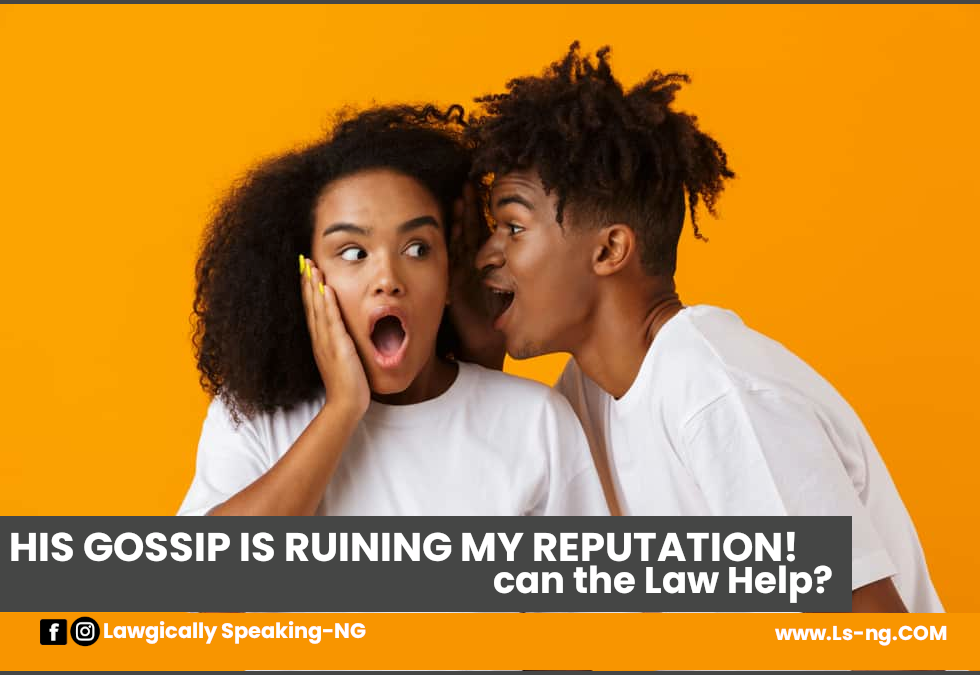Ever wondered if the law protects your good name or reputation? Let’s imagine a situation where you know of a person who deliberately transmits or tells concocted lies with the intention of ‘rubbishing’ you before people. Can the law help you in such a situation?
The answer to the above question is an emphatic ‘yes”. That is to say the law actually protects your good name (we will call it – your reputation). In fact, although the law gives every Nigerian the Constitutional Right of freedom of expression, the law goes further to provide a balance to this Constitutional right. This is to prevent persons from ruining the reputation of others under the disguise of free speech or freedom of expression.
That said, the realm of the law that offers protection to your reputation is the ‘law on Defamation’. In few words; Defamation is any unjustified expression that destroys the reputation of another person in the eyes of right thinking members of the society. Just so we clear the air, don’t forget that where someone has no good reputation, there is nothing the law can protect for him. After all, no one can damage already damaged goods. Agreed?

The law on Defamation sure has its technicalities so we will discuss it here in general terms. Where you are faced with a situation like the one described in this article, do well to contact a lawyer so that the specifics of your individual case are well attended to. With that said, we resume.
Like we stated previously, defamation is any unjustified expression or statement by another person that destroys your reputation in the eyes of right thinking members of the society. The defamatory statement may have been in writing or it may have been made orally. Where it is in writing or produced in any hard copy form, it is called ‘Libel’. On the other hand; where the defamatory statement is made by word of mouth, it is called ‘slander’.
Generally, the mere fact that someone publishes a defamatory writing about you (libel) is enough for the Court to award some monetary compensation in your favor. This means you are not generally expected to show or prove how the defamatory publication or writing made you suffer any loss (put technically; libel is actionable per se). Don’t throw the party yet please, because getting compensation in a libel suit still depends on how well the necessary facts are proved in Court and if your case succeeds at all after the Court’s evaluation. These necessary facts in a libel suit usually include; the fact that the written/published statement is in fact defamatory (or has a defamatory imputation), the statement referred to you in particular, the statement was made public or published.
Where the defamation is done orally or using gestures (slander), it is a general rule that the hurt or damage caused by the slanderous words must be proved before you can claim monetary compensation from the Court (put technically; slander is not actionable per se) This is not always the case though (put differently there are exceptions to this general rule).
We also must mention that apart from the fact that you can sue anyone who defames your good name, defamation is also a criminal offense– Section 373 of the Criminal Code Act. This means that a person who defames another person can be arrested and charged to Court. Where this happens if such a person is found guilty, he or she can be sent off to prison.
Interestingly too, in this age and time of social media, it is also an offence to intentionally share false information in other to cause annoyance, danger, hatred, criminal intimidation, or needless anxiety to another person. If charged and convicted of this offence, the penalty is fine of not more than 7 million Naira or imprisonment of not more than three years or both fine and imprisonment-Section 24 of the Cybercrimes Act of 2015. We concede that there are no statistics to measure the implementation of this law but ignorance of the law is not an excuse. Please be guided.

Also Know that;
Generally, not every vulgar word or insult or annoying statement amounts to defamation or Slander. For example uncouth words said during a heated argument or quarrel are generally not considered to amount to defamation. Note that this is a general rule which means it can be different in some instances. That’s why we mentioned consulting a lawyer much earlier.
Even Companies can sue for Defamation. Surprised? Better don’t be. The law recognizes that defamatory information about can company can ruin its profits and customer goodwill.
Also there are many defenses available when one sues another for Defamation. Some examples are the defences of innocent dissemination and justification or truth.
What if, instead of attempting to ruin your good name by writing or talking, your ‘attacker’ takes a different approach. Let’s imagine that, the person (the attacker) threatens to release or post a video or picture in which you can be seeing doing ‘everything not meant for the public eye’ and demands for money in exchange for not releasing the video/picture and damaging/humiliating your good name. Can the Law help the victim of such a black mail? We will deal with this a subsequent article. Keep your fingers crossed and your eyes ready. Thanks for reading
N. F. Nkobowo BL
The information above is only provided for general information purposes and does not amount to legal advice or soliciting. Also, No Lawyer-client relationship has been created and neither can such a relationship be implied. This information is not intended to substitute the services of a lawyer, if you need legal advice, kindly consult a lawyer for your specific needs. For any further information, you could send us a mail via contact@ls-ng.com



